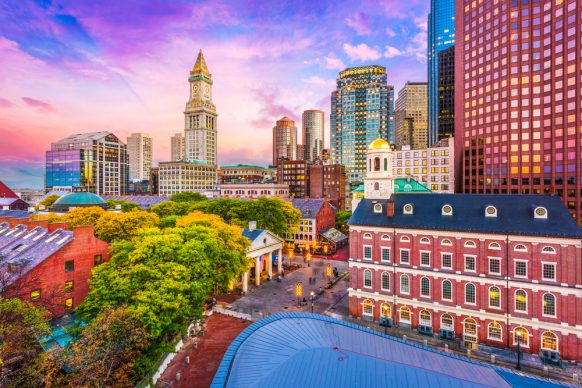Massachusetts is one of America’s most culturally rich states. Home to the Boston Tea Party and Paul Revere, Massachusetts played a significant role in Colonial Era America. The state was also the setting of the battle of Bunker Hill, the first major battle in the American Revolutionary War. Not only does Massachusetts hold historical significance, it’s also home to the Museum of Fine Arts and Fenway Park, and the Red Sox baseball team. However, the state doesn’t have quite such a rich history when it comes to US gambling, having only recently expanded its offerings.
Is it legal to bet on sports in Massachusetts?
Yes! Sports betting is now permitted in Massachusetts after Governor Charlie Baker signed a bill into law legalizing the activity on August 10 2022. It’s the 36th state in the USA to make the move to legalize, and the wheels are now well and truly in motion for the launching of Massachusetts’ own sports betting market.
Unlike the neighboring states of Rhode Island and New Hampshire — where bettors must be at least 18 years old — you’ll need to be 21 to place a sports wager in Massachusetts.
It’s also not clear when exactly sports betting will go live in the Bay State. No timeline has been given as part of the new law, although some more optimistic voices have suggested it could launch in time for the upcoming football season. The law does, however, charge the Gaming Commission with setting out rules and regulations to govern the Massachusetts betting market, as well as a licensing process for those who wish to operate within the state.
In any case, we’ll be the first to let you know as soon as anything changes!
Massachusetts Sports Betting Revenue
Generating funding was a large impetus for legalization of sports betting in Massachusetts, with revenue from in-person wagering and fantasy sports taxed at 15%, and mobile wagering revenue taxed at 20%. But where’s the money going to go? The new law sets out which areas will receive funding from sports betting revenues:
- 45% to the state’s General Fund, which is used for the yearly budget.
- 27.5% to the Gaming Local Aid Fund, which is distributed to cities and towns in the state.
- 17.5% to a newly created Workforce Investment Trust Fund, which will provide grants to low-income communities in order to promote job opportunities.
- 9% to the state’s Public Health Trust Fund, which in turn will be invested in the prevention and treatment of problem gambling.
- 1% to a new Youth Development and Achievement Fund.
History of Sports Betting in Massachusetts
Prior to Gov. Baker signing a bill to legalize sports betting in August 2022, it was only possible to make pari-mutuel bets on horse racing events in Massachusetts — all other forms of sports betting were illegal in the state. In the past, betting on greyhound racing was also popular, but it was outlawed in 2009 by the Massachusetts Greyhound Protection Act.
In March 2018, prior to the repeal of the Professional and Amateur Sports Protection Act (PASPA), the Massachusetts Gaming Commission released a 187-page white paper outlining the various aspects that lawmakers should consider when discussing the legalization and regulation of Massachusetts sports betting. The white paper discussed key legal aspects that lawmakers across the entire country can refer to when it comes to creating sports betting legislation.
The Gaming Commission’s white paper also touched on revenue and estimated that the state could earn between $9m and $61m in tax revenue from sports betting, depending on taxes and regulation. The white paper put forward the example of restricting sports betting to land-based casinos with a tax rate of 6.75%, estimating that the state could generate $8.6m a year with these taxes. The paper also estimated that the state could see tax revenues of $61.3m if both online sports betting and land-based sports betting were legalized and taxed at a rate of 15%.
Where will I be able to place bets on sporting events in Massachusetts?
Now sports betting has been legalized in Massachusetts, all existing casinos in the state may apply for a license to host in-person sports betting. Encore Boston Harbor and Springfield MGM have already built sports bars in their locations in anticipation of the launch of sports betting, and Plainridge Park intends to do the same. Raynham Park and Suffolk Downs may also open on-site sports books.
Within the new law, there’s scope for three casinos, two racetracks, and up to seven other companies — such as FanDuel or DraftKings — to launch their own mobile sports betting apps. Of course, the law also stipulates you’ll have to be within the state in order to place a wager — you won’t be able to bet across state lines.
So, what are your options until sports betting goes live in the state? At the moment, Massachusetts bettors may make pari-mutuel wagers on horse racing online and at the state’s two horse racing tracks.
| Racetrack | Location | Contact | Opening Hours | |
|---|---|---|---|---|
| Suffolk Downs | 525 William F McClellan Hwy, Boston, MA 02128, USA | +1 617-567-3900 | [email protected] | Monday – Closed Tuesday – Closed Wednesday 11am – 5:30pm Thursday 11am – 4:30pm Friday – Saturday 11am – 9pm Sunday 11am – 8pm |
| Plainridge Racecourse | 301 Washington St, Plainville, MA 02762, USA | 1-844-327-4347 | [email protected] | 24 hours |
What sports will I be able to bet on?
Once sports betting goes live in Massachusetts, bettors will be able to wager on professional and most collegiate sports as well as eSports. However, you can’t place bets on in-state college teams unless they’re playing in a tournament such as March Madness or a conference tournament. This is in line with the laws in several other states.
That means Bay State bettors will be able to wager on the likes of American football, basketball, baseball, soccer, tennis, golf, and many other more niche sports.
What else can I bet on in Massachusetts?
There are several options available to Massachusetts gamblers, thanks to the signing of the Expanded Gaming Act 2011. The state has a number of horse racing tracks, as one operational casino — though there are two more in the pipeline. The Act also proposed for one slot parlor to be built. The slot parlor was opened at the Plainridge Racecourse, making it the Plainridge Park Casino, in 2015.
The bill divided the state into three regions (A, B, and C), allowing one casino to be constructed in each region. While the casinos in regions A and B have licenses, the casino in region C does not, due to the potential competition of a tribal casino. The Mashpee Wampanoag community begin preparations for a tribal casino in 2014, though actual construction has been postponed.
At these establishments’ visitors can engage in a variety of casino games including:
- Slots
- Poker
- Blackjack
- Craps
- Roulette
- Baccarat
| Casino Name | Location | Region According to Expanded Gaming Act 2011 | Contact | Opening Hours | |
|---|---|---|---|---|---|
| MGM Springfield | One MGM Way, Springfield, MA 01103, USA | Region B | +1 413-273-5000 | [email protected] | 24 hours |
| Plainridge Park Casino | 301 Washington St, Plainville, MA 02762, USA | (slot parlor) | +1 508-576-4500 | [email protected] | 24 hours |
| Wynn Encore Boston Harbor | 1 Broadway, Everett, MA 02149, USA | Region A | +1 857-770-7000 | [email protected] | 24 hours |
Although the state is only home to two racetracks, one casino and a slot parlor there is a small number of US gambling options for Massachusetts residents. Residents can enjoy online fantasy sports games at DraftKings and FanDuel.
Social casino sites are also permitted in the state. These online games can be played for fun, rather than wagering real money. Zynga, Big Fish, Slotomania and Double Down are some of the most popular social casino games. The Plainridge Casino also operates a Play4Fun network on its website, giving users a preview of what is on offer at the casino.
The state operates a lottery with both state and multistate drawings that residents can enter for a chance to win huge cash prizes. Charitable gambling is permitted, with raffles and bingo being the two legal forms of charitable gambling permitted.
While Massachusetts gambling laws are outdated and do not address online gambling, Section 17A, Chapter 271 of the state’s criminal law states that it is illegal to gamble or place wagers using a telephone. The punishment for telephone gambling is “a fine of not more than two thousand dollars or by imprisonment for not more than one year.” One could interpret this to include online gambling like the Federal Wire Act does, although no one in the state has ever been charged under this law for gambling online.
With that being said, the signing of the Expanded Gaming Act in 2011 has shown that Massachusetts is one of the more progressive states in the nation and, even this small step suggests that in the future, the state may permit online gambling and online sports betting sites.
Are offshore gambling sites legal in Massachusetts?
Massachusetts state laws have not been updated to include regulation for offshore gambling sites, but we’d recommend steering clear of these sites. The lack of regulation means there is little to no protection for users and their money.
You can spot offshore gambling sites by looking at the website’s domain name. If you see a domain that ends in .EU or .AG it does not hold a license to operate in Massachusetts and therefore should be avoided at all costs.
Will it be safe to bet on sports in Massachusetts?
Massachusetts already has strict gambling laws, and the new regulations that will come into effect as a result of legalization will likely follow this trend. These laws will be designed to offer protection to bettors so that Massachusetts sports betting is safe — for example, use of credit cards for gambling will be prohibited. However, it’s also up to punters to game responsibly, and never bet more than they can afford to lose. If you believe that you, or a loved one, may be suffering from a gambling problem, you can contact the National Council on Problem Gambling and The Massachusetts Gaming Commission for support and responsible gambling resources.
You can contact the National Problem Gambling Helpline via:
Phone: 1-800-522-4700
Text: 1-800-522-4700
Online chat
You can contact the Massachusetts Gaming Commission’s 24-hour helpline via:
Phone: 1-800-426-1234
Who regulates gambling in Massachusetts?
The Massachusetts Gaming Commission (MGS), founded in 2011, is responsible for overseeing gambling activity in the state. Created with the signing of the Expanded Gaming Act, the MGS was tasked with creating a fair, transparent and participatory process for implementing the act. The Massachusetts Lottery is overseen by a five-member commission that is responsible for setting policies and monitoring its operation.
How old do I have to be to gamble in Massachusetts?
Massachusetts law states that you must be 18 years old to play lottery, bingo, or bet on horse racing, and that you must be 21 years old to gamble at a casino. This age limit of 21 will also apply to sports betting — both mobile and in-person — when it launches in the state.
The journey to legal and regulated sports betting in Massachusetts
1719 – The state of Massachusetts banned all lotteries. Lottery games were legal before this but after a while, the public attitude towards them began to take a negative turn.
1745 – In order to fund King George’s war effort, the states first ever public lottery was launched. In the years up until 1761 more than 11 public lotteries were authorized. When the Lords of Trade in England caught wind of this the practice was met with disapproval and public lotteries were banned again. Lotteries in the state resurfaced during the American Revolution.
1833 – The state moved to ban all lottery games.
1934 – On track pari-mutuel wagering on horse racing and dog racing events was legalized.
1935 – The first dog racing tracks, Wonderland Greyhound Park and Taunton Dog Track, were
opened.
1941 – A third dog track, Raynham Greyhound Park was opened.
1947 – Harness racing began at the Bay State Raceway. The venue was later renamed to Foxboro Raceway, but closed in 1997.
1971 – The Massachusetts state lottery was legalized. This included games at lottery terminals where residents can purchase tickets. This was also the first lottery in the state since 1833.
1972 – The first lottery ticket was sold.
1981 – The Taunton Dog Track was closed, and operations were picked up by the Raynham track. Shortly after, the Raynham track was renamed to the Raynham-Taunton Greyhound Park.
1992 – Congress passed the Professional and Amateur Sports Protection Act (PASPA) prohibiting sports betting across the US. Four states were made exempt from the law: Nevada, Delaware, Oregon and Montana. These states had legal sports betting regulations in place.
1999 – Plainridge racetrack opened, replacing the Foxboro Raceway.
2007 –A number of casino expansion bills were introduced but none of them received enough support to become law. Although one of the bills made it to the Governor of the state, he did not sign the bill as he did not believe the estimated employment and revenue figures.
2009 – All forms of dog racing were outlawed by the Greyhound Protection Act.
2011 – The state of Massachusetts passed the Expanded Gaming Act. This allowed for three casinos to be constructed in the state and one slot parlor. The act divided the state into three regions, A, B and C with one casino allocated to each region. This also led to the creation of the Massachusetts Gaming Commission.
2012 – The Massachusetts Gaming Commission assumed authority over horse racing in the state.
2013 – MGM Resorts International and The Hard Rock Casino Group were awarded the first licenses and paid a $400,000 non-refundable deposit. The same year, the Wampanoag Tribe of Gay Head (Aquinnah) announced plans for gambling establishment at a community center on their reservation. These plans were blocked by the state.
2014 –The Mashpee Wampanoag tribal community began to make preparation to build a casino on their land after finalizing a compact with the state. The state of Massachusetts sued to block the project, using the argument that the tribe gave up gambling rights in a 1983 land settlement. According to the state, the tribe agreed its lands would be subject to state law. The tribe argued that this agreement was superseded by the 1988 Indian Gaming Regulatory Act.
2015 – A slot parlor was opened at the Plainridge Park Casino. The Bureau of Indian Affairs approved the taking of over 300 acres of land for the Mashpee tribe. Some of this land would be used to construct the casino in Taunton.
2016 – The Wynn Boston Harbor Casino began construction. A group of property owners in the Taunton area challenged the 2015 decision arguing against the decision to take the land into trust and used the argument that the government could not take land into trust for tribes recognized after the 1934 Indian Reorganization Act.
2018 – In March, the Massachusetts Gaming Commission released a 187-page white paper that outlined the various aspects lawmakers should consider when discussing the legalization and regulation of sports betting and legal online sports betting sites.
On 14 May, the Court reached a decision. In a 7–2 vote it was agreed that one of the clauses in PASPA violated the Tenth Amendment, as it commandeered power from states to regulate their own gambling industries. This paved the way for all US states to decide whether or not to legalize sports betting. In the weeks after the repeal of PASPA a number of US sportsbooks launched across the country.
In August, MGM Resorts opened the MGM Springfield casino in Massachusetts. In September it was announced that construction on the Mashpee tribe casino was postponed. In 2019, another casino resort, the Encore Boston Harbor, opened its doors.
2022 – On August 10, Gov. Charlie Baker signed a bill into law legalizing sports betting. Before it can launch in the state, the Gaming Commission must set out over 200 regulations to govern the industry within the state, and must also create a process through which operators can be granted a license. Some have optimistically suggested sports betting could launch in Massachusetts in time for the upcoming football season, but the process has taken over a year in states like Ohio and Maine.
Latest Betting News
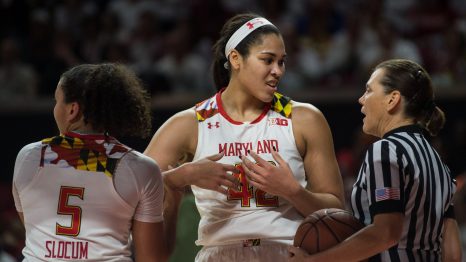
Connecticut Sun star Brionna Jones is back with her collegiate program in her first coaching job; She dishes on what led to her return.

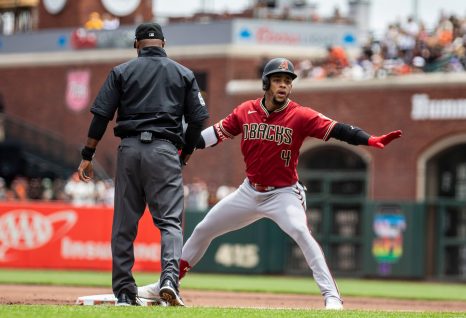
Taking a look at prop bet picks on Zac Gallen, Nathan Eovaldi, Ketel Marte and Corbin Carroll.

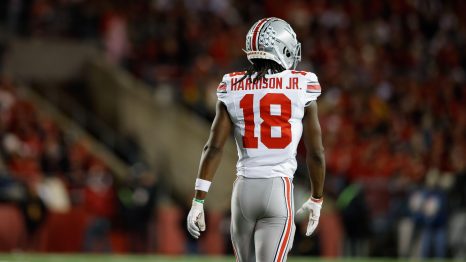
The Cardinals have reached the NFL basement once again, so it’s no surprise to see some draft questions in the mailbag. Let’s get to it. “If the Cardinals were to hold the No. 1 pick in next spring’s NFL Draft. How do you think that plays out?” – Cody Marmon Kyle Odegard: Quarterback prospects Caleb…

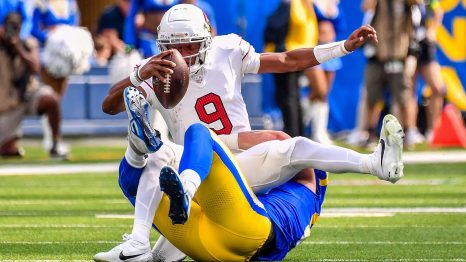
The Cardinals leapfrog the Panthers, while the Bears still remain in strong position to land the No. 1 pick in the draft.

